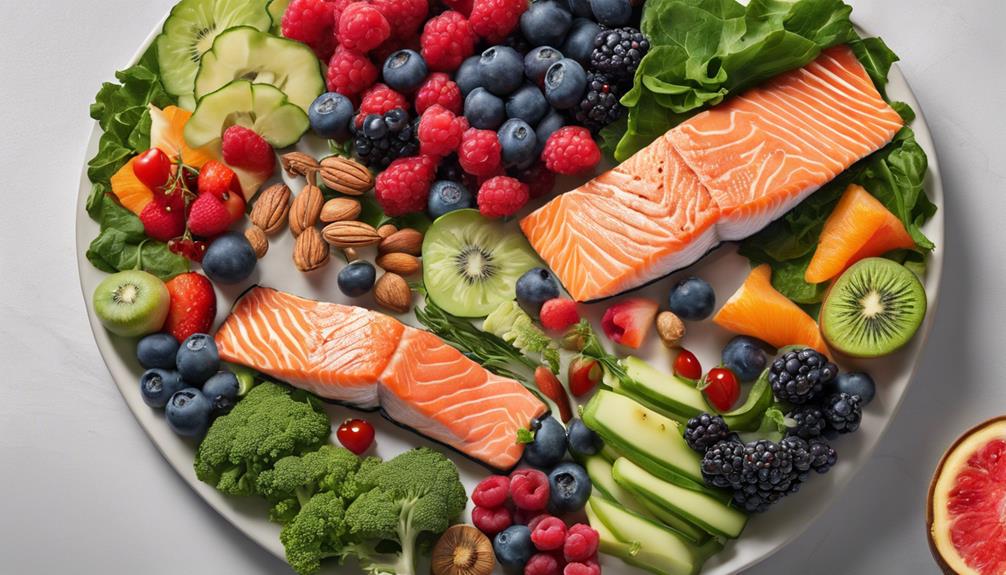Have you ever thought about the ways in which your eating habits can affect your experience with breastfeeding as a new mother?
Making sure you nourish yourself properly is not only important for your own well-being but also vital for your baby's development.
By incorporating essential breastfeeding diet tips into your daily routine, you can provide the necessary nutrients for both you and your little one.
But what exactly should you be focusing on to optimize this important aspect of motherhood?
Let's explore some key recommendations that can support your breastfeeding experience and overall health.
Key Takeaways
- Stay well-hydrated to support milk production and adjust fluid intake based on urine color.
- Focus on nutrient-rich foods like lean meats, fish, and leafy greens for optimal nutrition.
- Ensure adequate intake of essential vitamins and minerals like iron, calcium, and Omega-3 fatty acids.
- Limit caffeine and alcohol, avoid high-mercury seafood, and monitor for infant allergies by eliminating potential triggers.
Hydration and Fluid Intake
Ensuring proper hydration and fluid intake is essential for new moms who are breastfeeding, as it directly impacts milk production and quality. Breast milk is primarily water, making adequate hydration vital.
Dark yellow urine can be a sign of dehydration, indicating the need for more fluids while nursing your baby. Thirst is a reliable cue to drink water, but aiming for clear or light yellow urine is even better.
By satisfying your thirst, you not only support your overall health but also secure a steady milk supply for your little one. Monitoring your hydration levels through urine color and smell can guide you in adjusting your fluid intake to meet the demands of breastfeeding.
Nutrient-Rich Foods to Prioritize

Let's now focus on the Nutrient-Rich Foods to Prioritize to support your health and your baby's development while breastfeeding.
- Include Protein-Rich Foods: Opt for lean meats, fish, eggs, dairy products, legumes, nuts, and seeds to aid in muscle repair and provide you with sustained energy throughout the day.
- Incorporate Calcium-Rich Foods: Prioritize dairy products, leafy greens, and fortified foods to certify strong bones for you and your baby and to support milk production.
- Choose Iron Sources: Incorporate red meat, poultry, lentils, and fortified cereals into your diet to prevent fatigue, support blood production, and replenish the iron stores that can be depleted during breastfeeding.
- Opt for Omega-3 Fatty Acids: Include sources like salmon, walnuts, and flaxseeds to promote healthy brain development in your baby and support your overall well-being.
Essential Vitamins and Minerals
What key vitamins and minerals are essential for supporting both your health and your baby's development during the breastfeeding period?
As breastfeeding moms, ensuring adequate intake of iron is essential to prevent fatigue and maintain energy levels needed for caring for your little one. Additionally, calcium plays a vital role in supporting bone health and muscle function, benefiting both you and your baby during this period.
Vitamin D is essential as it aids in calcium absorption, contributing to bone development in both mother and child. Incorporating omega-3 fatty acids, specifically DHA, is important for promoting brain and eye development in infants.
Furthermore, B vitamins, including B12, are essential for energy production and optimal nervous system function for both you and your baby. Prioritizing these key vitamins and minerals in your diet can help support your well-being and your baby's growth and development while breastfeeding.
Foods and Drinks to Limit

To promote your baby's well-being while breastfeeding, it's important to be mindful of the foods and drinks you consume and limit certain items for the safety and health of your little one.
- Limit Caffeine: Consuming too much caffeine can lead to potential agitation in the baby through breast milk. It's advised to restrict intake to 2-3 cups per day to avoid any negative effects.
- Avoid Alcohol: It's best to completely avoid alcohol while breastfeeding as even small amounts in breast milk can be unsafe for the infant. Prioritize your baby's health by steering clear of alcoholic beverages.
- Watch Mercury Levels: Be cautious of seafood high in mercury like shark or swordfish as it can pose risks to the baby's developing nervous system. Opt for safer seafood choices to protect your little one.
- Minimize Processed Foods: Highly processed and sugary foods can impact your breast milk quality. Opt for whole foods like dried fruits, fortified products, and foods rich in maternal vitamin D to maintain a healthy diet for both you and your baby.
Managing Allergies and Sensitivities
Dealing with allergies and sensitivities while breastfeeding can be a challenging but important aspect of caring for your baby's health and well-being. Breastfed babies may develop allergies to common allergens like dairy, soy, wheat, eggs, fish, nuts, peanuts, and corn.
If you suspect your baby is experiencing food allergy symptoms, keeping a food diary can help identify potential triggers. Eliminating suspected allergens from your diet, such as dairy or soy products, might alleviate allergy symptoms in your infant. Consult a healthcare provider for guidance on managing infant allergies through breastfeeding.
It's critical to pay attention to any signs of allergic reactions in your baby and take steps to address them promptly. Remember, you're not alone in this journey, and seeking support and advice can make a significant difference in managing allergies and sensitivities while breastfeeding.
Your dedication to your baby's well-being is commendable, and with the right information and support, you can navigate this challenging aspect of breastfeeding successfully.
Frequently Asked Questions
What Is the Best Diet for Breastfeeding Mothers?
We believe the best diet for breastfeeding mothers includes nutrient-rich foods like lean protein, whole grains, fruits, and vegetables. It's important to consult with a healthcare provider for personalized dietary recommendations, ensuring ideal nutrition for lactation.
What Foods Should New Breastfeeding Moms Have?
We should focus on a diet that includes protein-rich foods like lean meat, eggs, dairy, beans, and seafood. Whole grains, fruits, vegetables, and hydration are essential. These choices help us maintain energy levels, support milk production, and overall health.
What Must a Breastfeeding Mother Eat?
We need to prioritize nutrient-rich foods for best health during breastfeeding. Including iron, calcium, and protein is crucial. It's important to boost calorie intake by 330-400 daily, staying hydrated and seeking guidance from healthcare providers for a balanced diet.
What Should I Eat to Be Successful Breastfeeding?
To succeed in breastfeeding, we prioritize a diet rich in protein, calcium, omega-3s, whole grains, fruits, veggies, and hydration. These choices bolster milk production, baby's development, bone health, and overall well-being.
Conclusion
To summarize, remember to:
- Hydrate regularly
- Prioritize nutrient-rich foods
- Support milk production with essential vitamins and minerals
Limit foods and drinks that may affect your baby, and manage any allergies or sensitivities carefully. Stay strong, nourished, and dedicated to providing the best for yourself and your little one.
Let's embrace these essential breastfeeding diet tips for a healthy and happy journey together!









